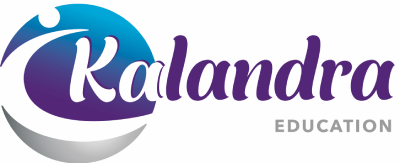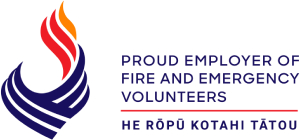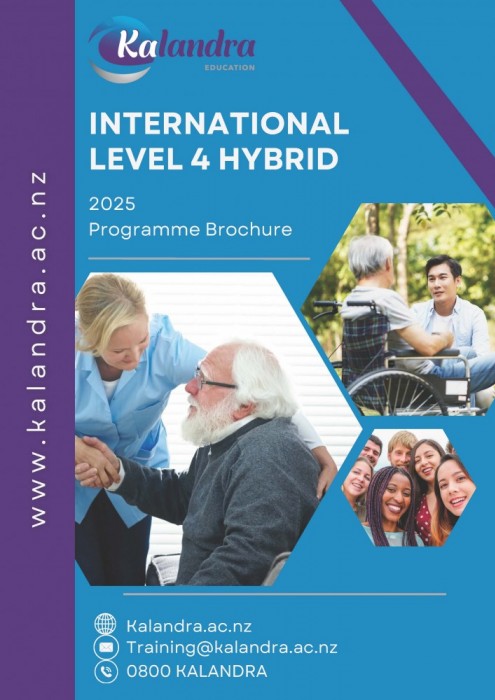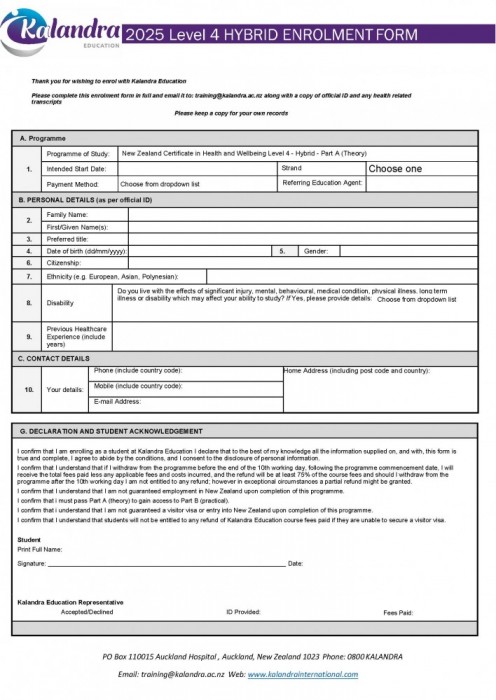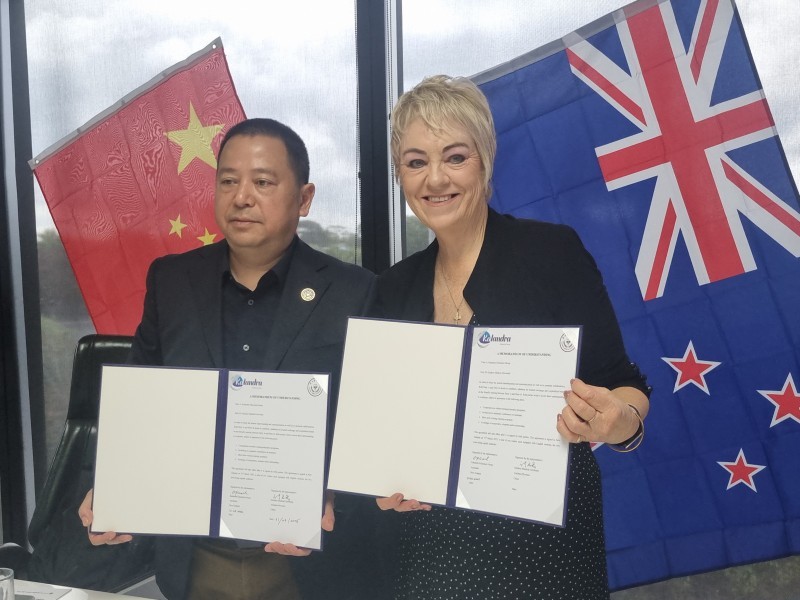Certificate in Health & Wellbeing (Level 4) with strands in Palliative Care Support and Dementia Care Support - HYBRID
Programme Start Dates PART A:
- 14 April
- 19 May
- 23 June
- 28 July
- 8 September
- 13 October
Note: all intake dates are subject to change depending on number of enrolments and all have limited numbers!
2025 Programme Start Dates PART B:
- Monday 12 May
- Monday 23 June
- Monday 4 August
- Monday 29 September
- Monday 10 November
Note: all intake dates are subject to change depending on number of enrolments and all have limited numbers!
Tuition Fee:
- Part A (Theory) -
$7500 Reduced in 2025 to $5500
- Part B (Practical in New Zealand) -
$10,000 Reduced in 2025 to $6500 (this includes placement fees, credit fees, admin fees)
Note: Payment options are available for Part A, Part B must be paid in full prior to coming to New Zealand. All fee payments will go into Public Trust.
Additional Costs (may occur):
- Police Vetting $25
- Device
Delivery
This programme is very unique. It is broken down into two distinct parts.
Part A: Theory (37 weeks)
•Undertaken in current location (country of origin)
•Online and supported
•Students can continue to work while they study
•37 weeks
•25 hours learning per week
Students MUST achieve Part A to gain entry to Part B
Part B: Practicum (11 weeks)
•Undertaken in New Zealand
•Week 1 is face to face with Kalandra lecturers on campus
•10 weeks of arranged placement / unpaid internship at an appropriate facility
•Placement can be at various locations around New Zealand
•This can be undertaken on a visitors visa.
Programme Overview
NZQF: Level 4
Total credits: 120
Delivery length: 50 weeks (including 2 holiday weeks).
Theory (Part A): 37 weeks
Practical (Part B): 11 weeks
Total learning hours: 1200
Directed online learning: 25 hours per week online. Students are provided with an individual learning plan and are supported throughout their study by experienced lecturers.
Work placement: 400 Clinical hours required (nonpaid) arranged by kalandra.
At successful completion of the Certificate in Health & Wellbeing (Level 4) with strands in Palliative Care and Dementia Care, students will be awarded the New Zealand Certificate in Health and Wellbeing (Social and Community Services) (Level 4).
Programme Content - compulsory components
The programme is taught over seven modules.
Module 1 - Relationships in Healthcare (24 credits)
This module is designed for students to gain a more in-depth knowledge of relationships and communication in healthcare. This, to develop an understanding of their own perceptions. This person-centred approach is intrinsic to the module which consists of the following unit standards:
- Work collaboratively in a health or wellbeing setting.
- Describe relationships between practitioners, and roles and responsibilities in group processes in a health care context.
- Develop and maintain positive relationships to achieve outcomes, in a health or wellbeing setting.
Module 2 - Personal Growth (18 credits)
This module is designed for students to gain a more in-depth understanding about personal growth as a worker in the healthcare industry. This person-centred module focuses on the individual, their strengths and improving their weaknesses and consists of the following unit standards:
- Demonstrate ethical practice and reflect on own ethical practice as a mental health and addiction support worker.
- Apply self-reflection in a health or wellbeing setting.
- Describe leadership in a health or wellbeing setting.
Module 3 - Contributions to the Workplace (15 credits)
Using a strength and knowledge-based approach, this module, is designed for students to gain a more in-depth understanding about the culture of service quality and safety, in health and wellbeing settings. This module consists of the following unit standards:
- Contribute to a culture of service quality, professionalism and ethical practice in a health or wellbeing setting.
- Contribute to quality and safety in a health or wellbeing setting.
Modules 4 & 5 are completed in the elective of choice, as detailed further below.
Module 6 - Communication & Engagement (17 credits)
Working in this complex environment requires a person-centred and strengths-based approach. This module is designed for students to gain a more in-depth understanding of communication and engagement with the client, family/whanau and community, and consists of the following unit standards:
- Communicate to support people’s health and wellbeing.
- Engage with tangata whenua and provide information on community support services in a health or wellbeing setting.
- Describe communication, and correct use of de-escalation approaches in mental health and addiction services.
Module 7 - Cultural identity and related issues (10 credits)
This module, designed for students to gain a more in-depth understanding of cultural identity and related issues, combines a person-centred and directed approach, with an awareness and knowledge of the impact of other cultures and cultural identity. This module consists of the following unit standards:
- Demonstrate knowledge of cultural identities and culture-related issues in an aged care, health, or disability context.
- Explain the impacts of colonisation on health and wellbeing for tangata whenua, and in a health or wellbeing setting.
Programme Content - elective components
Note: only one elective can be chosen for the completion of this certificate
Module 4 & 5 – Dementia Care (36 credits)
These modules are designed for students already working in, or those who intend to develop a career supporting, the health and wellbeing of clients diagnosed with Dementia as well as their family and/or whanau.
Improvements in medical care and lifestyles means people are living longer and the fastest growing demographic internationally is 65 and over. With longer life spans there are also increasing numbers being diagnosed with dementia and that number is expected to triple in the next 35 years. The primary purpose of these two Health Care Support programmes is to meet the increased demand for dementia-qualified Health Care Assistants who understand the progression and effects of dementia and can provide optimal care and attention which enhances the client’s daily living experience or health outcome.
This module consists of the following unit standards:
- Person-Centred Care: Provide person-centred care, support, dignity, empathy and respect to the client, their family/whanau, and colleagues.
- Effective Capability: Maximise their effectiveness as a Health Care Assistant, provide safe and ethical practice and contribute to a constantly changing environment.
- Knowledge of Dementia Care Issues: Maintain awareness of issues affecting dementia care clients including their effects on the client and the risk of the client of vulnerability, abuse, and neglect in order to enhance their support capability.
- Communication and Support: Able to acknowledge a person's culture and previous experiences, communicate effectively and provide support in a mental health/addiction and/or dementia care setting.
- Cultural Awareness: Able to provide a service that respects their own and New Zealand's cultural awareness, especially the effects of Maori as tangata whenua.
- Leadership: Able to exhibit personal leadership in the health and wellbeing service that demonstrates self-awareness and self-reflection.
- Ethical and Professional Conduct: Able to demonstrate ethical, professional and safety orientated behaviour, contributing effectively to the health and wellbeing organisation.
- Health Sector Understanding: Able to understand the role and the implications that this role has on the wider health sector.
- Effective Support and Care: Able to effectively support and nurture all people living and working in the dementia care environment.
Module 4 & 5 – Palliative Care (36 credits)
The modules provide learners with the opportunity to build on the knowledge or experience gained in the workplace and become more involved in the care and support of those who are at the end of their lives. Palliative Care is a specialist area and requires the carer to be able to provide comfort cares to the client and support whanau members through this period.
With medical interventions people are living far longer and even the palliative stage can stretch for much longer than it did in the past. People can be in palliative care but still living in the community, only entering a facility when they are unable to be cared for by whanau or support agencies. Today, palliative care focuses on providing comfort cares and strategies to make the life of the client in palliative care as positive and comfortable as possible.
This module consists of the following unit standards:
- Contribute to a personal plan for a person with complex needs.
- Describe and apply knowledge of supporting a person with complex needs.
- Apply strategies to support a person with an acute condition in a health or wellbeing setting.
- Apply strategies to support a person with a chronic condition in a health or wellbeing setting.
- Apply a palliative care approach in a health and wellbeing setting.
- Recognise and respond to changes in the health and wellbeing of a person.
Employment Pathways
Employment Pathway: http://Government Information on Careers and Employment Outcomes
Dementia Care - Graduates of this qualification will have the skills and knowledge to be employed in a range of roles. Working alongside people, family and whanau across health and wellbeing sectors, and they can be employed in roles such as:
- Health Care Assistant – Aged Care and/or Dementia Care Unit.
- Health Care Assistant - Primary and Acute Care, Therapeutic Programme Care.
- Medical Practice Assistant.
- Homecare Support Worker / Caregiver.
Palliative Care - Graduates of this qualification will have the skills and knowledge to be employed in a range of roles. Working in the community with people, family and whanau across health and wellbeing sectors, and they can be employed in roles such as:
- Health Care Assistant – Aged Care and/or Disability sector.
- Health Care Assistant - Primary and Acute Care, Therapeutic Programme Care.
- Community Agency.
- Homecare Support Worker / Caregiver..
Education Pathways
For graduates who wish to pursue further study related to health and wellbeing, this qualification may lead on to the New Zealand Certificate in Public Health and Health Promotion (Level 5), New Zealand Diploma in Addiction Studies (Applied) (Level 6) or Bachelor Degrees in related health and wellbeing subject areas. For graduates who intend to pursue further study related to leadership and management, this qualification may lead on to the New Zealand Certificate in Business (First Line Management) (Level 4), the New Zealand Diploma in Business (Level 5) and New Zealand Diploma in Business (Level 6) or Bachelor Degrees in related leadership and management subject areas.
Entry Criteria
New Zealand Citizen or Resident
- Aged 18 years of age and over
- NCEA Level 1 Numeracy and Literacy or equivalent
- The learner holds the New Zealand Certificate in Health and Wellbeing (Level 3) or the equivalent qualification or experience
- Clean criminal record (an initial check will be completed through the New Zealand Police to ensure the learner is a fit and proper person to be working with vulnerable people, should the learner not have one)
- Physically able to do the job
- Willingness to work with the older person
- Supporting Documentation:
- Academic /Healthcare sector qualifications
- Work placement documents
*Students must also be currently working with at least two clients with the condition within the strand they are studying.
Overseas students:
•Aged 18 years of age and over
•IELTS academic overall band score of 5.5 with no individual band lower than 5.0 or recognized equivalent (result must be no more than 2 years old and from one test)
•Healthcare sector qualifications / experience equivalent to Level 3
•Clear criminal check
•Physically able to do the job
•Willingness to work with the older person
•Access to the internet and a device
•Interview with academic staff
For those who do not have experience we recommend starting with the Comprehensive Care of the Older Person programme
To Apply
Complete this Application Form and email along with supporting documentation to: training@kalandra.ac.nz
- Current ID (including residency status if applicable) - we recommend a certified copy of your passport, birth certificate, or certificate of citizenship*
- Police check (home country)
- Copy of healthcare experience for Level 3 Equivalency
May include but is not limited to;
•Nurses (Diploma and Bachelor)
•Midwives
•Caregivers
•Medical doctors
•Allied health such as; physios, occupational therapists, speech and language therapists
Upon interview, basic care skills will be assessed and applicants with little to no previous basic care experience may be required to undertake practicum during Part A – before being allowed to undertake Part B.
Student Handbook: Click on this link to download the Student Handbook 2024.
Read what some of our graduates think about studying at Kalandra:
- Maraea Tauhinu: "It was a big challenge for me to start studying again as I had left school at 15 and am now 58 years old. The team at Kalandra guided me all the way through from the day l started to the day I graduated." Read more ......
- Eslam Gadallah: "The programme showed me how I can help my clients set their goals, write an achievement plan and then my role is to work alongside them to help each client achieve those goals. I try to apply everything I studied to my work each day." Read more ....
- Lois Filipi: "I really enjoy my job as a Health Care Assistant now because after studying at Kalandra, and getting so much support from my tutor........I now know what I am doing and am confident in myself and my knowledge." Read more......
Tuition is Online
It is required that you have internet and a device, in order to complete your studies successfully. You need to be able to access: Facebook and our online learner platform. You must also undertake research online and produce documents using Microsoft Office - Word, Excel, PowerPoint.
Link to Mobile Compare which identifies internet providers and allows you to compare the options.
The following computer suppliers have competitively priced example devices:
Last Updated: 17 February 2025
Back to programmes
